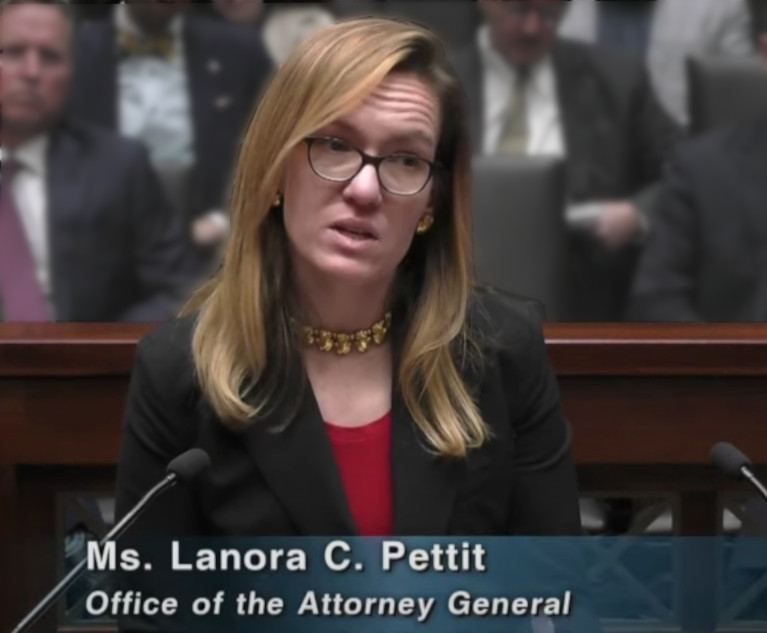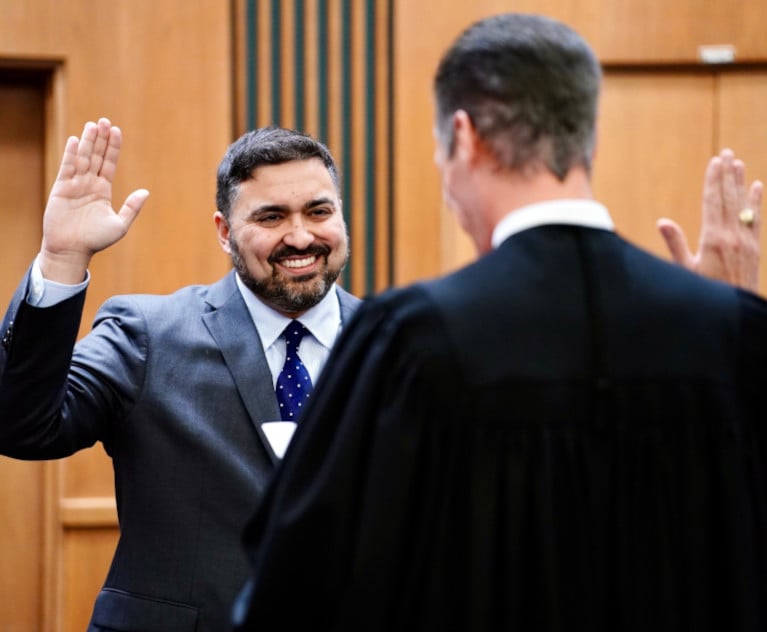Tenth Circuit Affirms Denial of Qualified and Sovereign Immunity Defenses
The circuit court affirmed the rulings rejecting correction officers' qualified immunity defense to Section 1983 claims, and rejecting a sovereign immunity defense to tort claims brought under state law.
July 21, 2020 at 12:30 PM
7 minute read
 Stephen Masciocchi and Jessica Smith
Stephen Masciocchi and Jessica Smith
 Against the backdrop of nationwide protests over police misconduct and a national debate over the scope of qualified immunity from constitutional claims, the Tenth Circuit addressed correction officers' qualified and sovereign immunity defenses in Sawyers v. Norton, — F.3d –, 2020 WL 3424927 (10th Cir. June 23, 2020). The circuit court affirmed the district court's rulings rejecting the officers' qualified immunity defense to Section 1983 claims and rejecting a sovereign immunity defense to tort claims brought under state law.
Against the backdrop of nationwide protests over police misconduct and a national debate over the scope of qualified immunity from constitutional claims, the Tenth Circuit addressed correction officers' qualified and sovereign immunity defenses in Sawyers v. Norton, — F.3d –, 2020 WL 3424927 (10th Cir. June 23, 2020). The circuit court affirmed the district court's rulings rejecting the officers' qualified immunity defense to Section 1983 claims and rejecting a sovereign immunity defense to tort claims brought under state law.
Factual and Procedural Background
Plaintiff George Sawyers set fire to an art gallery, believing that God had told him to do so. While he was a pretrial detainee in the Rio Grande County Jail, he was so delusional that, among other troubling acts of self-harm, he removed his right eyeball from its socket to prevent it from being "harvested by witches." He then sued: (1) the county sheriff and three on-duty corrections officers in their individual capacities for deliberate indifference to his medical needs under 42 U.S.C §1983; (2) the sheriff in his official capacity under Section 1983 for failure to train and supervise the three officers; and (3) all four defendants in their individual and official capacities for negligence under Colorado law. The court observed that the official capacity claims were really claims against the county.
The district court granted defendants' summary judgment motions in most respects, but it denied qualified immunity to the three officers on the Section 1983 deliberate-indifference claim and denied sovereign immunity to the county on the state-law negligence claim. Defendants took an interlocutory appeal from these denials, which is permitted in some respects when a district court denies a either a qualified or sovereign immunity defense, but the Tenth Circuit affirmed the district court's rulings on the immunity defenses.
Deliberate Indifference and Qualified Immunity Under Section 1983
The circuit court noted that it had appellate jurisdiction to review the qualified immunity ruling under the collateral order doctrine to the extent it involved "abstract issues of law." Id. at *6 (citation omitted). It did not, however, have jurisdiction to review the district court's factual conclusions.
To overcome a qualified immunity defense, "a plaintiff must show (1) facts demonstrating the officials violated a federal constitutional or statutory right, which (2) was clearly established at the time of the defendant's conduct." Id. at *7. A qualified immunity defense succeeds if a plaintiff fails to establish either element. Kerns v. Bader, 663 F.3d 1173, 1180 (10th Cir. 2011) ("In fact, the Supreme Court has recently instructed that courts should proceed directly to, 'should address only,' and should deny relief exclusively based on the second element, in seven particular circumstances outlined in Pearson v. Callahan, 555 U.S. 223, 236–42, 129 S.Ct. 808, 172 L.Ed.2d 565 (2009)[.]") (citations omitted).
As to the second element, the district court ruled that Tenth Circuit precedent had clearly established that Sawyers was entitled to protection against deliberate indifference. Sawyers, 2019 WL 2327756, at *11. In support, it cited Garcia v. Salt Lake City, 768 F.2d 303, 307 (10th Cir. 1985), and Martin v. Bd. of Cty. Comm'rs, 909 F.2d 402 (10th Cir. 1990). But in their opening appellate brief, the officers presented "only a cursory statement" to the contrary; they thus waived their argument that the law was not clearly established. Id.
As to the first element, the constitutional protection against deliberate indifference to an inmate's serious medical condition "springs from the Fourteenth Amendment's Due Process Clause." Id. (citation omitted). The standard comprises objective and subjective components. The objective element exists if harm is serious enough to be cognizable as "Cruel and Unusual" punishment. Id. at *8. Medical needs are "considered sufficiently serious as to satisfy the objective prong if the condition has been diagnosed by a physician as mandating treatment or is so obvious that even a lay person would easily recognize the necessity for a doctor's attention." Id. The subjective element exists if an official "knows and disregards an excessive risk to inmate health or safety." Id. (citation omitted).
The Tenth Circuit affirmed the denial of summary judgment as to both components. Fatal to their appeal on both the objective and subjective components, the defendants primarily challenged the district court's factual determinations, which the circuit court could not second-guess. Because the district court had concluded that "a reasonable jury could infer facts to conclude" against the defendants, they were not entitled to summary judgment on the deliberative indifference claim. Id. at *10; see also id. at *8.
Sovereign Immunity for Tort Claims
Under the Colorado Governmental Immunity Act (CGIA), public entities are generally immune from liability for claims for injuries "which lie or could lie in tort" unless the immunity has been waived. Id. at *12 (quoting C.R.S. §24-10-106(1)). But the CGIA waives immunity for public entities "in an action for injuries resulting from [the] operation any … correctional facility … or jail." C.R.S. §24-10-106(1)(b)). This waiver applies only to pretrial detainees, i.e., claimants "who are incarcerated but not yet convicted of the crime for which such claimants are being incarcerated if such claimants can show injury due to negligence." Id. §24-10-106(1.5)(b).
Exercising its appellate jurisdiction under the collateral order doctrine, the Tenth Circuit ruled that the district court properly denied sovereign immunity under the CGIA, because Sawyers was a pretrial detainee and his injuries arose from an alleged omission of public employees in connection with the operation of a jail. Notwithstanding this statute, the defendants argued that the county had derivative immunity under the CGIA based on their personal immunity. But they overlooked that under C.R.S. §24-10-118(2)(a), "no … immunity may be asserted [by a public employee] in an action for injuries resulting from the circumstances specified in section 24-10-106(1)." And section 106(1) expressly waived immunity for the operation of a jail in the case of pretrial detainees.
New Cause of Action for State Constitutional Violations by Law Enforcement
On June 19, 2020, the Colorado General Assembly adopted significant new legislation that, among other things, creates a new cause of action for violations of state constitutional rights by law enforcement. See S.B. 20-217, 72d Gen. Assemb., 2d Reg. Sess. §3 (Colo. 2020). The Colorado Legislature created this new cause of action in the wake of nationwide protests over well-publicized, serious police misconduct. The Tenth Circuit noted that the CGIA "does not apply to" this new cause of action and that state "qualified immunity" is not a defense to it. Id. at *14 & n.23. This brand new legislation did not apply in this appeal. Whether Sawyers could raise such a claim on remand would be subject to a retroactivity analysis. But a cause of action under the new law could be asserted by future claimants.
Finally, whether other states and the federal government adopt similar reforms that create new claims and modify or eliminate qualified immunity remains to be seen. The Supreme Court recently declined to grant certiorari in multiple cases that would have presented the court with an opportunity to reconsider its qualified immunity doctrine. See Baxter v. Bracey, 590 U.S. ___, 2020 WL 3146701 (2020) (denying petition for writ of certiorari). At least one justice would do so. See id. at *1 (Thomas, J. dissenting) ("I have previously expressed my doubts about our qualified immunity jurisprudence. … Because our §1983 qualified immunity doctrine appears to stray from the statutory text, I would grant this petition.").
Stephen Masciocchi and Jessica Smith are attorneys at Holland & Hart specializing in complex commercial litigation. Steve assists clients with federal and state appeals and class actions in high-stakes trial and appellate litigation. Jessica has substantial appellate experience and leads the firm's religious institutions and First Amendment practice.
This content has been archived. It is available through our partners, LexisNexis® and Bloomberg Law.
To view this content, please continue to their sites.
Not a Lexis Subscriber?
Subscribe Now
Not a Bloomberg Law Subscriber?
Subscribe Now
NOT FOR REPRINT
© 2025 ALM Global, LLC, All Rights Reserved. Request academic re-use from www.copyright.com. All other uses, submit a request to [email protected]. For more information visit Asset & Logo Licensing.
You Might Like
View All


Law Firms Mentioned
Trending Stories
- 1Letter from Asia: As American Firms Retreat, Will Loyal UK Firms Regain Market Share In Asia?
- 2King & Spalding Snags Restructuring Duo From Alston & Bird
- 328 Firms Supporting Retired Barnes & Thornburg Litigator in Georgia Supreme Court Malpractice Case
- 4Boosting Litigation and Employee Benefits Practices, Two Am Law 100 Firms Grow in Pittsburgh
- 5EMT Qualifies as 'Health Care Provider' Under Whistleblower Act, State Appellate Court Rules
Who Got The Work
J. Brugh Lower of Gibbons has entered an appearance for industrial equipment supplier Devco Corporation in a pending trademark infringement lawsuit. The suit, accusing the defendant of selling knock-off Graco products, was filed Dec. 18 in New Jersey District Court by Rivkin Radler on behalf of Graco Inc. and Graco Minnesota. The case, assigned to U.S. District Judge Zahid N. Quraishi, is 3:24-cv-11294, Graco Inc. et al v. Devco Corporation.
Who Got The Work
Rebecca Maller-Stein and Kent A. Yalowitz of Arnold & Porter Kaye Scholer have entered their appearances for Hanaco Venture Capital and its executives, Lior Prosor and David Frankel, in a pending securities lawsuit. The action, filed on Dec. 24 in New York Southern District Court by Zell, Aron & Co. on behalf of Goldeneye Advisors, accuses the defendants of negligently and fraudulently managing the plaintiff's $1 million investment. The case, assigned to U.S. District Judge Vernon S. Broderick, is 1:24-cv-09918, Goldeneye Advisors, LLC v. Hanaco Venture Capital, Ltd. et al.
Who Got The Work
Attorneys from A&O Shearman has stepped in as defense counsel for Toronto-Dominion Bank and other defendants in a pending securities class action. The suit, filed Dec. 11 in New York Southern District Court by Bleichmar Fonti & Auld, accuses the defendants of concealing the bank's 'pervasive' deficiencies in regards to its compliance with the Bank Secrecy Act and the quality of its anti-money laundering controls. The case, assigned to U.S. District Judge Arun Subramanian, is 1:24-cv-09445, Gonzalez v. The Toronto-Dominion Bank et al.
Who Got The Work
Crown Castle International, a Pennsylvania company providing shared communications infrastructure, has turned to Luke D. Wolf of Gordon Rees Scully Mansukhani to fend off a pending breach-of-contract lawsuit. The court action, filed Nov. 25 in Michigan Eastern District Court by Hooper Hathaway PC on behalf of The Town Residences LLC, accuses Crown Castle of failing to transfer approximately $30,000 in utility payments from T-Mobile in breach of a roof-top lease and assignment agreement. The case, assigned to U.S. District Judge Susan K. Declercq, is 2:24-cv-13131, The Town Residences LLC v. T-Mobile US, Inc. et al.
Who Got The Work
Wilfred P. Coronato and Daniel M. Schwartz of McCarter & English have stepped in as defense counsel to Electrolux Home Products Inc. in a pending product liability lawsuit. The court action, filed Nov. 26 in New York Eastern District Court by Poulos Lopiccolo PC and Nagel Rice LLP on behalf of David Stern, alleges that the defendant's refrigerators’ drawers and shelving repeatedly break and fall apart within months after purchase. The case, assigned to U.S. District Judge Joan M. Azrack, is 2:24-cv-08204, Stern v. Electrolux Home Products, Inc.
Featured Firms
Law Offices of Gary Martin Hays & Associates, P.C.
(470) 294-1674
Law Offices of Mark E. Salomone
(857) 444-6468
Smith & Hassler
(713) 739-1250









